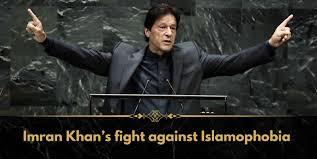Imran Khan’s Speeches on Islamophobia
1. Condemnation of State-Sponsored Islamophobia
In his address to the United Nations General Assembly, Prime Minister Khan condemned the rise of Islamophobia, attributing it to state-sponsored actions. He cited instances where Muslims were falsely blamed for spreading the coronavirus, denied medical attention, and faced boycotts of their businesses. He emphasized that such actions violate the principles of freedom of religion and belief .
2. Call for an International Day to Combat Islamophobia
Prime Minister Khan proposed the establishment of an International Day to Combat Islamophobia, urging the United Nations to recognize the growing challenges faced by Muslims worldwide. He welcomed the UN’s adoption of March 15 as this day, marking a significant step in acknowledging and addressing Islamophobia on a global scale .
3. Promotion of Interfaith Understanding
Emphasizing the importance of interfaith dialogue, Prime Minister Khan advocated for mutual respect among different religious communities. He urged Muslim leaders to explain to the Western world the deep reverence Muslims hold for their faith, particularly for the Prophet Muhammad (PBUH) and the Holy Quran, to foster understanding and reduce prejudice
4. Critique of Western Double Standards
Prime Minister Khan pointed out the double standards in Western approaches to freedom of expression. He compared the legal protections against Holocaust denial in Europe to the lack of similar respect for Islamic symbols, suggesting that such inconsistencies contribute to the perpetuation of Islamophobia .
5. Encouragement of Collective Action Among Muslim Nations
Recognizing the limitations of individual national efforts, Prime Minister Khan called for a unified approach among Muslim-majority countries to combat Islamophobia. He emphasized that collective action would be more effective than isolated protests and urged leaders to work together to address the issue comprehensively
Conclusion
Prime Minister Imran Khan’s speeches reflect a consistent and strategic approach to combating Islamophobia. By advocating for international recognition, promoting interfaith dialogue, highlighting double standards, and encouraging collective action, he has positioned Pakistan as a vocal advocate for the rights and dignity of Muslims worldwide. His efforts underscore the importance of unity and understanding in addressing global challenges related to religious intolerance.

